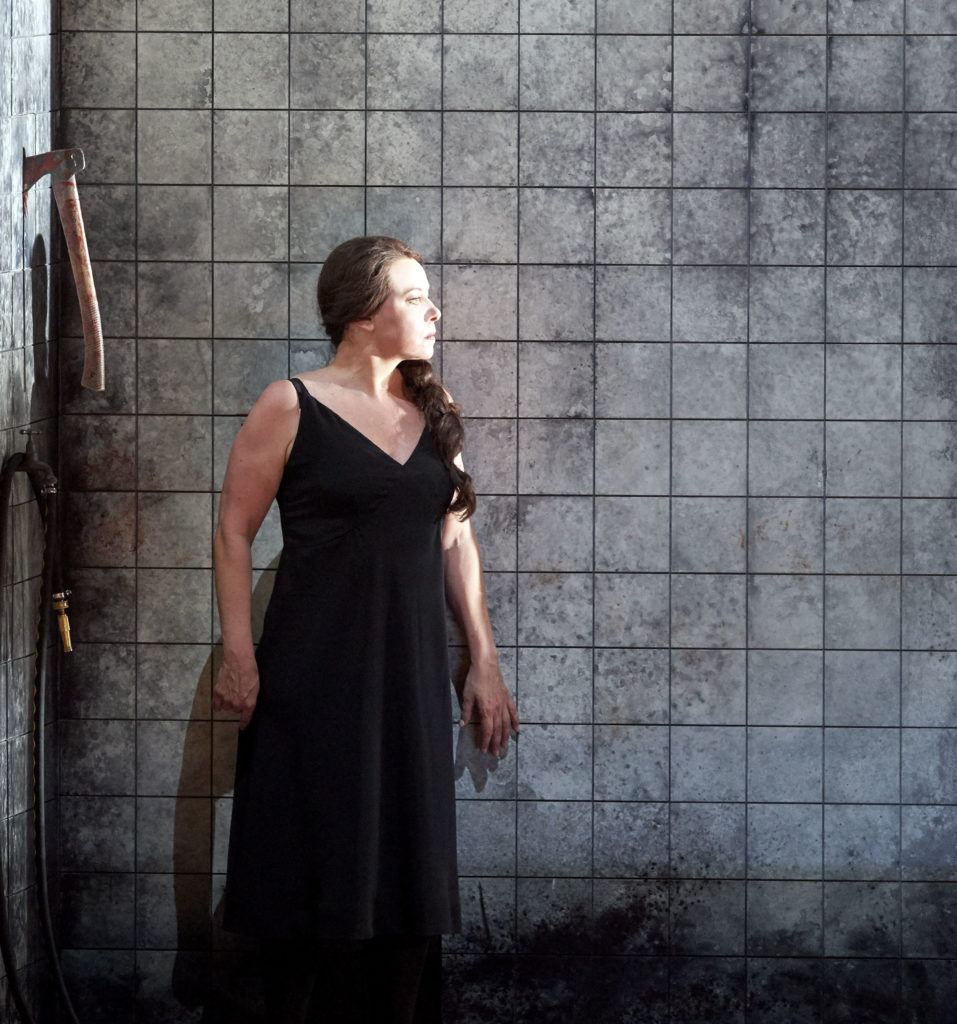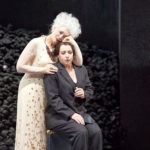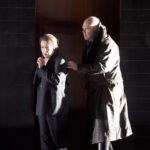 Vienna State Opera’s previous Elektra reminded us of the opera’s classical roots through giant dismembered Greek statues. Uwe Laufenberg’s new Vienna production is modernist, brutally minimalist. It looks forward into the 20th century. As does Richard Strauss’s expressionist music- nothing, except for Salome(1905), that we’ve heard before- dissonant, its ‘fluid tonality’ anticipating Schoenberg. A radical departure, it crossed for Strauss a red line never to be repeated.
Vienna State Opera’s previous Elektra reminded us of the opera’s classical roots through giant dismembered Greek statues. Uwe Laufenberg’s new Vienna production is modernist, brutally minimalist. It looks forward into the 20th century. As does Richard Strauss’s expressionist music- nothing, except for Salome(1905), that we’ve heard before- dissonant, its ‘fluid tonality’ anticipating Schoenberg. A radical departure, it crossed for Strauss a red line never to be repeated.
Left of stage, naked women cavorting in what looks like a latrine. Blood-splattered, they’re being showered down with a hose! What seems a volcanic heap, actually a coal bunker. Five women, watched over by female prison guards in grey uniforms, are talking about Elektra. ‘Is she not a King’s daughter?’ – Nothing in the world is more royal than her. The one who sticks up for Elektra – none of you is worthy to breathe her name- is put into a straight-jacket. It’s a grim vision, between penitentiary and concentration camp, ‘the Kommandant’ armed with a baton.
Totally alone. Allein weh, ganz allein. Her father gone, slaughtered; murdered in his bath, purple blood flowing from his wounds. Nina Stemme’s Elektra, very manly in a double-breasted suit, her hair slicked-back, is as if de-sexed. Far removed from Stemme’s romantic roles, the sex goddesses, it’s a brave characterisation. With soaring intensity, her soprano a power house, she holds the stage for much of two hours.
Agamemnon, where are you father? She pleads, hasn’t he the power to carry her away. Now it’s our turn. His woman sleeps in what was his royal bed. Stemme truly enacts her cosmic rage. She plays with, and finally opens, a black suitcase, her father’s. She lays out on a silk handkerchief, his cap his gun; then cleans and holds high an axe, prancing and dancing across the stage: her victory dance, Siegestanze, tansen!
Chrysothemis, her sister ( Regine Hangler) has come to warn her. What does her mother’s daughter want? Chryso appeals for conciliation with their mother Clytemnestra and her consort, Aegisth. Hangler in a white lace dress, her soprano is expressive, with powerful reserves. She is a woman, she insists, and wants a woman’s fate, to live, to have children. Better dead than live without life.
The façade of this high-rise palace lights up revealing lifts moving up and down. Guard dogs sniff around beneath the coal heaps. Clytemnestra descends. Waltraud Meier, white-haired, her sparkling diamonte evening wear suggests luxury and excess. She sings of her sick-livered body, of the god’s remorse. (Why must her powers be crippled.) Her distinguished mezzo lacks some ballast. Her daughter Elektra patrols outside the lift area. Finally, she will come down to speak to her. Meier is led off in her wheelchair.
 The dramatically-charged mother-daughter faceoff is a highlight scene. Do you dream mother? – Her every limb cries out for death. Meier sings of her gruesome nightmares: this dream must have an end. Stemme replies cryptically, when the blood sacrifice is made, you will dream no more. (The staging is curious; Stemme is moving around in Meier’s wheelchair.) Stemme mentions her son Orestes, ‘a taboo in this house’. (He is coming? She’ll position her armed guards.) Finally, Stemme, Was bluten muss, your neck must bleed. And I will see you die at last- Stemme on a tremendous high note- then you’ll stop dreaming. Meier crumpled with guilt, brutalised by her daughter’s grilling, is wheeled off. The guards shine their torches on Elektra.
The dramatically-charged mother-daughter faceoff is a highlight scene. Do you dream mother? – Her every limb cries out for death. Meier sings of her gruesome nightmares: this dream must have an end. Stemme replies cryptically, when the blood sacrifice is made, you will dream no more. (The staging is curious; Stemme is moving around in Meier’s wheelchair.) Stemme mentions her son Orestes, ‘a taboo in this house’. (He is coming? She’ll position her armed guards.) Finally, Stemme, Was bluten muss, your neck must bleed. And I will see you die at last- Stemme on a tremendous high note- then you’ll stop dreaming. Meier crumpled with guilt, brutalised by her daughter’s grilling, is wheeled off. The guards shine their torches on Elektra.
Chrysomethis’s rushes in, her news, Orestes is dead- initially denied by Elektra. (No one can know!). It occasions another high-powered scene in which Elektra tries to win her over in her revenge plans. Who will kill Aegisth, their stepfather? Elektra goads her sister on; you are so strong. Stemme ugly and brutalised convinces as Elektra worn down by others’ guilt. Finally Chryso runs away. Elektra now alone, wipes the axe and cowers.
A hooded figure appears, weirdly dressed, like a rough sleeper, in a black leather coat. Is she one of the women of the house? Held, shaven-headed, chin white-stubbled, his powerful baritone has impressive stage presence. He sings of an assignment. Do I have to see you? Stemme is actually spitting out her emotion. He’s come on behalf of Orestes, who’s glad she is living.
Elektra is barely recognisable. Verwandt bin ich dein Blut– he’s related, a blood brother, both without their father. Elektra sehe ich dich. He sees her, yet her eyes are terrifying furchtbar, her cheeks sunken. Orest lebt! Orestes lives, uninjured!
Wer bist du, denn, Who are you, she asks. The dogs recognise him. A moment of revelation, the orchestral strings uneasy, like a windstorm. He and she remove their coats. They embrace in a corner of the stage. They fondle each other with – in this production- some suggestion of incest. Oh, let her eyes see – more beautiful than any dream. Noble, indescribable: stay with me. Then she will die, more blessed than she lived. 
In Strauss and Hoffmannstal’s poignant scene, Stemme sings, she believes she was a king’s daughter, then beautiful when she looked in the mirror. Her glorious hair, before which men trembled. Now dirty, tangled. Stemme sings, a harrowing figure. Does he understand, she has had to give everything up. Her glamour, her beauty, her youth. She kneels. Why is he looking so anxiously at her?
He will do it! In haste. He opens up her father’s suitcase, uncovering his military uniform. Stemme stands by in a plain black dress, black stockings, as if still in mourning after all these years. He leaves, then she realises she didn’t give him the axe!
Lippert’s Aegisth stands on a darkened stage . Lichter, is no one there to light up? Who is the strange man who calls himself Orestes? And the announcement that he’s dead? Indubitable! She, Elektra, is as if dancing around him, the one she’s been waiting for. (Held’s Orestes, hooded, gets into the lift with him.) Murder- you are murdering me! Down the other lift , the body of Clytemnestra.
Chryso, like a fair-weather bell, enthuses at Orestes side, and rushes across to Elektra. As if a thousand birds are released, the music comes out of her.
In Elektra’s powerful aria, Stemme sings, with her rage spent, she cannot move, or lift herself . Her limbs stiffen, she is doomed to silence. She is done for by the gods. The ‘burden of happiness’, the hope of a new start, is thwarted by a relentless, inescapable fate.
Yet, in Laufenberg’s scheme, Stemme leads a dance of celebration! She sings,’she carries the burden of Fate, and dances for them’. It’s a frantic, desperate troupe, a commotion leading off stage.
With this star cast, and headed by a tour-de-force from Stemme, it would be churlish to complain about Rolf Glittenberg’s staging. (I overheard an American saying, it reminded him of Nazi Germany.) Vienna State Opera orchestra (and Chorus) conducted by Michael Boder were on exemplary form in Strauss’s stunningly modernist score. Strauss/Hofmannstahl’s opera is a grim, nihilistic masterpiece without religious consolation, its characters caught up in a web of fate. A portent for the 20th century. © P.R.26.06.2017
Photos: Nina Stemme as Elektra; Waltraud Meier, Klytaemenestra and Nina Stemme; Alan Held as Orest and Nina Stemme
© Wiener Staatsoper/ Michael Pöhn
viennaoperareview.com
Vienna's English opera blog
